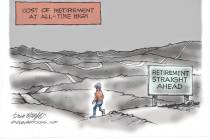Public-sector pension reform
The Chicago Transit Authority, which provides bus service across the country's third-largest metropolitan area, is sputtering in the breakdown lane. The financially strained agency is prepared to slash service by 8 percent next month and increase fares between 25 and 50 percent.
If the state government doesn't provide a massive infusion of subsidies sometime soon, the fiscal crisis could worsen.
The reason? Out-of-control salary and benefit costs for its unionized work force of more than 10,000. Bus drivers, maintenance workers and other employees get guaranteed annual pay increases and contribute next to nothing to their defined-benefit pension and retirement health care funds. Riders and state taxpayers pick up that burden.
The pension fund alone has more than $2 billion in unfunded liabilities, meaning additional service cuts and fare increases could await commuters in the years ahead.
"Our current retirement and health care benefits are too rich for what we can afford," authority Chairwoman Carole Brown told the Chicago Tribune.
Rather than roll over and watch the entire system bleed to death, Ms. Brown and transit authority officials are pushing for a bold reform to reduce future operating deficits: They want all future CTA hires to be enrolled in a 401(k)-type defined contribution retirement plan.
That would give the authority cost certainty as new employees replace the existing work force through attrition. And it would spare system users from having to pay salaries to drivers and repairmen no longer working on their behalf.
Defined-benefit pensions and retirement health care subsides have all but vanished from the private sector because they bankrupt firms. Look at the American airline and auto industries. Now these kinds of benefits are threatening to cause the same kind of damage to government monopolies.
Of course, public employee unions don't care that their pay and benefit packages offer taxpayers less and less return on their confiscated income. According to the Heartland Institute, the unions that represent CTA workers have indicated they'll oppose such reforms through collective bargaining.
The only way to head off fiscal ruin is to change these unsustainable systems at the legislative level. Illinois state Sen. Bill Brady, R-Bloomington, has sponsored legislation to move not only CTA workers, but all future state hires into 401(k)-style retirement plans, providing employees who choose to save a pre-tax portion of their income with a modest, taxpayer-funded match.
Such an effort requires courage in a union-dominated state. Thus far, no Nevada lawmaker or governor has been brave enough to champion pension reform and push for its passage, though former Gov. Kenny Guinn tried -- unsuccessfully -- to eliminate retirement health care subsidies for future state hires.
The pain already felt by Chicago foreshadows the kinds of sacrifices Nevadans will have to make if their elected officials can't rein in public-sector retirement costs.























